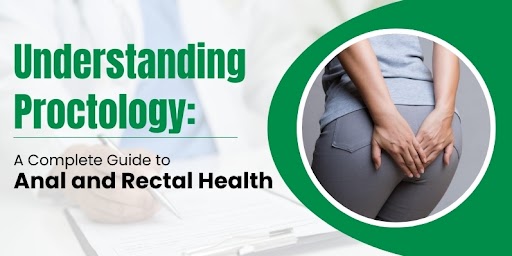Understanding Proctology: A Complete Guide to Anal and Rectal Health
 Proctology, also known as colorectal surgery, is a medical specialty that focuses on the anus, rectum, and sigmoid colon-related diseases. While these areas are essential for overall health and well-being, people often avoid discussing them because of society’s rules and discomfort in discussing such issues. This guide aims to shed light on the importance of proctology and how maintaining anal and rectal health can improve your quality of life.
Proctology, also known as colorectal surgery, is a medical specialty that focuses on the anus, rectum, and sigmoid colon-related diseases. While these areas are essential for overall health and well-being, people often avoid discussing them because of society’s rules and discomfort in discussing such issues. This guide aims to shed light on the importance of proctology and how maintaining anal and rectal health can improve your quality of life.
What Does a Proctologist Do?
Proctologists, or colorectal surgeons, are professionals who specialize in treating diseases and disorders of the rectum, anus, and colon. They manage conditions like hemorrhoids and anal fissures to more complex issues like colorectal cancer and inflammatory bowel disease. Other than surgical treatments, proctologists provide non-surgical care and lifestyle advice to promote better digestive health.
Common Proctological Conditions
- Hemorrhoids: Swollen veins in the rectum or anus, often caused by straining during bowel movements, pregnancy, or prolonged sitting. Its symptoms are pain, itching, and rectal bleeding.
- Anal Fissures: Small tears in the anal lining that can cause severe pain and bleeding during bowel movements.
- Fistulas: Abnormal connections between the anus and nearby skin or organs, often resulting from infections.
- Colorectal Cancer: Cancer in the colon or rectum, which may present as changes in bowel habits, blood in stool, or unexplained weight loss.
- Rectal Prolapse: A condition where the rectum slips out of its normal position, often requiring surgical intervention.
Signs You Should See a Proctologist
If you experience any of the following symptoms, it may be time to consult a proctologist:
- Persistent rectal pain or bleeding
- Unexplained changes in bowel habits
- Lumps or swelling near the anus
- Difficulty controlling bowel movements
- Chronic constipation or diarrhea
Early diagnosis and treatment are necessary for effective management and prevention of complications.
Preventive Measures for Anal and Rectal Health
Maintaining a healthy lifestyle is key to preventing many proctological conditions:
- High-Fiber Diet: Consume plenty of fruits, vegetables, and whole grains to ensure smooth bowel movements and avoid constipation.
- Hydration: Drink sufficient water to keep your digestive system functioning properly.
- Regular Exercise: Physical activity helps improve digestion and prevents obesity, a risk factor for many colorectal problems.
- Good Bathroom Habits: Avoid straining during bowel movements and don’t delay the urge to go.
Diagnostic and Treatment Options
Proctologists use various diagnostic tools such as colonoscopy, sigmoidoscopy, and imaging tests to evaluate anal and rectal conditions. Treatment options can range from lifestyle changes and medications to simple treatments with small cuts or no cuts and surgeries, depending on the seriousness of the condition.
Ayurveda in Proctology
Ayurveda is the ancient science of holistic healing, and for a long time, it has provided effective treatments for proctological conditions, such as piles, fissures, and fistulas. It can offer minimally invasive and safe treatments with precise solutions through its specialized therapies like KsharSutra, allowing faster recovery with minimum discomfort. It focuses on herbal medications and dietary and lifestyle changes, which ensures long term health.
Conclusion
Proctology plays a major role in maintaining digestive health and overall well-being. By knowing symptoms early and adopting preventive measures, you can protect yourself from discomfort and serious health issues. Don’t hesitate to consult a proctologist if you see the symptoms —your health is worth it.